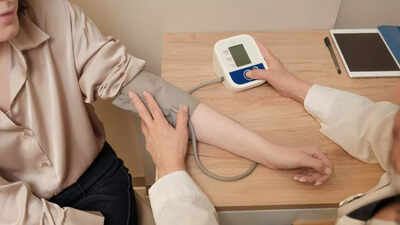ARTICLE AD BOX

Low blood pressure, or hypotension, is often overlooked because some people tolerate lower readings without symptoms. However, in many situations, particularly during critical illness or acute medical events, hypotension can be dangerous.
When blood pressure drops too low, oxygen-rich blood struggles to reach vital organs, which can lead to cellular damage, organ dysfunction, and even organ failure if not addressed promptly. Understanding hypotension involves exploring why adequate blood pressure is essential for organ perfusion, how the body compensates to maintain blood flow, which organs are most vulnerable, and what happens when these compensatory mechanisms fail.
Early recognition and treatment are crucial to prevent serious complications from low blood pressure.
Blood pressure and how low levels affect your organs
Blood pressure is the force blood exerts against the walls of blood vessels. It is measured as systolic/diastolic pressure (e.g., 120/80 mmHg). However, for organ perfusion, mean arterial pressure or MAP, the average pressure in the arteries, is more relevant. Organs rely on adequate pressure to ensure continuous blood flow.
When MAP drops below 60 to 65 mmHg, perfusion becomes inadequate, meaning organs no longer receive enough oxygen and nutrients.
Without sufficient perfusion, cellular metabolism is impaired, leading to cell injury or death.
Improve Low Blood Pressure Naturally: Here Are 4 DIY Home Hacks
Even if the systolic or diastolic pressures seem mildly low, prolonged hypotension can cause cumulative organ damage because organs are highly sensitive to oxygen delivery.
How low blood pressure leads to organ failure
According to the study published in the Journal of Anesthesia, Analgesia and Critical Care (2022), arterial hypotension during surgery and in the intensive care unit can significantly impact patient outcomes.
The authors highlight that maintaining adequate blood pressure is crucial for organ perfusion, as drops in pressure can lead to hypoperfusion and subsequent organ dysfunction or failure. The study outlines common causes of perioperative hypotension, explains its effects on vital organs, and discusses prevention strategies and remedies that clinicians can use to minimise complications.
At normal blood pressure, blood flow delivers oxygen and nutrients to tissues. Hypotension reduces this flow. The body attempts to compensate through:
- Increased heart rate to maintain cardiac output.
- Peripheral vasoconstriction redirects blood to essential organs like the brain and heart.
When hypotension is severe or prolonged, these compensatory mechanisms cannot keep up.
Organs experience hypoperfusion, leading to oxygen deprivation (hypoxia). Hypoxia impairs cellular energy production, leading to cellular dysfunction, apoptosis, and necrosis, which can accumulate into organ failure.
- Organ-specific vulnerabilities
Not all organs respond to hypotension the same way. Some are more susceptible due to high metabolic demands or limited autoregulatory capacity:
- Kidneys: The kidneys filter blood and require a constant supply of oxygen. Low blood pressure reduces renal perfusion, impairing filtration and potentially causing acute kidney injury (AKI).
- Liver: Reduced hepatic artery and portal vein flow can cause ischemic hepatitis, sometimes called “shock liver.”
- Brain: Cerebral perfusion drops in hypotension, potentially causing confusion, syncope, or even coma.
- Heart: Low coronary perfusion reduces oxygen delivery to cardiac muscle, increasing the risk of ischemia and arrhythmias.
The severity of organ damage depends on how low the pressure drops and how long it persists.
Even short periods of severe hypotension can trigger irreversible cellular injury, particularly in sensitive organs like the kidneys and brain.Role of duration and severity
- Magnitude: The lower the blood pressure, the greater the risk of organ hypoperfusion. MAP below 60 mmHg or systolic BP below 90 mmHg is considered particularly dangerous in critical care.
- Duration: Even moderate hypotension can cause organ injury if sustained over hours. Short, transient drops are generally better tolerated than prolonged hypotension.
Both factors interact: a brief but extremely low MAP can be as harmful as a longer, moderate hypotensive episode.
Low blood pressure and organ damage: Evidence from clinical studies and ICU data
Clinical studies and ICU data confirm the relationship between low blood pressure and organ damage:
- Patients with chronic kidney disease and low blood pressure exhibit higher mortality and worse renal outcomes.
- Intraoperative hypotension during surgery is associated with increased postoperative organ dysfunction and complications.
ICU meta-analyses show that hypotension strongly correlates with acute kidney injury, liver injury, neurological impairment, and overall mortality.Mechanistic studies support these observations, demonstrating that prolonged low perfusion directly injures organ tissue. In CKD patients, extremely low blood pressure shows a “J-shaped” relationship with renal outcomes too low a pressure worsens kidney function, even if modestly lower readings might be tolerated.
Organ failure patterns in acute low blood pressure
In acute hypotension scenarios (e.g., shock, major bleeding, sepsis), organ failure often follows a predictable pattern:
- Kidneys: First to show dysfunction due to high metabolic demand and limited autoregulatory reserve. Early signs include low urine output and rising creatinine.
- Liver: Reduced perfusion can lead to elevated liver enzymes and ischemic hepatitis.
- Brain: Hypoperfusion manifests as confusion, dizziness, or syncope.
- Heart: Low coronary flow may cause ischemia, arrhythmias, or cardiac arrest.
This pattern reflects each organ’s sensitivity to reduced oxygen delivery and its capacity for compensatory adaptation.
Conditions that increase the risk of organ failure in low blood pressure
Certain conditions exacerbate the risk of organ failure in hypotension:
- Pre-existing organ disease such as CKD or heart failure
- Advanced age or frailty, reducing compensatory mechanisms
- Rapid-onset hypotension, e.g., from bleeding or septic shock
- Prolonged hypotension, which cumulatively damages organs
Patients with multiple risk factors are particularly vulnerable, and even moderate hypotension may precipitate organ failure.Also Read | How many dry fruits to eat daily: Nutritionist reveals exact portions of almonds and walnuts to consume for maximum heart, brain, and overall health

 1 hour ago
4
1 hour ago
4








 English (US) ·
English (US) ·